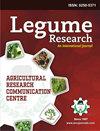Hybrid Pigeonpea (ICPH 2740) Nodular Activity and Biological Nitrogen Fixation as Influenced by Agronomic Practices
IF 0.8
4区 生物学
Q3 AGRONOMY
引用次数: 0
Abstract
Background: To explore the impact of agronomic practices on nodulation, nitrogenase activity and biological nitrogen fixation in hybrid pigeonpea, a field investigation was under taken at BW5 block ICRISAT development center (IDC), International Crops Research Institute for Semi-Arid Tropics (ICRISAT), Patancheru, Hyderabad, during kharif, 2021 and 2022. Methods: The seedlings were raised in portrays in advance to onset of monsoon during last week of May (28th May in 2021 kharif and 30th May in 2022 kharif) in both the years by filling portrays with cocopeat and vermicompost in 1:1 ratio. Transplanting of 24 days and 25 days old seedlings were done on 20th June in 2021 kharif and 23th June in 2022 kharif, respectively, on the same day of dibbling in the main field at 100 cm × 100 cm ,120 cm × 120 cm square geometry and 150 cm × 60 cm. Nutrient management treatments were imposed one week after sowing. Result: Among the planting methods higher nodule number and nitrogenase activity with transplanting compared to dibbling. 120 cm × 120 cm found higher nodule number plant-1 and nitrogenase activity but biological nitrogen fixation was higher with 100 cm × 100 cm ha-1 basis. With respect on nutrient management practices, control performed well in terms of higher nitrogenase activity and biological nitrogen fixation and on par with integrated approach of 100% soil test based NPK + vermicompost + PSB + seed treatment with Rhizobium. So, with transplanting method of establishment, 100 ´ 100 cm square plant geometry and 100% soil test based NPK + vermicompost + PSB + seed treatment with Rhizobium was recommended agronomic practices for hybrid pigeonpea.杂交鸽豆(icph2740)根瘤活性和生物固氮作用的影响
背景:为探讨不同农艺措施对杂交鸽豆结瘤、氮酶活性和生物固氮的影响,在2021年和2022年的农艺措施期间,在位于海得拉巴Patancheru的ICRISAT开发中心(IDC)、国际半干旱热带作物研究所(ICRISAT) BW5区块进行了实地调查。方法:在两个年份的5月最后一周(2021年收获季5月28日和2022年收获季5月30日),在雨季来临之前,用蚕茧和蚯蚓堆肥按1:1的比例填充幼苗。24日龄和25日龄秧苗分别于2021年收获季6月20日和2022年收获季6月23日在主田100 cm × 100 cm、120 cm × 120 cm和150 cm × 60 cm的方形几何尺寸上进行移栽。在播种后一周进行营养管理处理。结果:在不同的种植方式中,移栽的根瘤数和氮酶活性均高于点播。在100 cm × 100 cm ha-1基础上,植物根瘤数和固氮酶活性均高于120 cm × 120 cm;在养分管理方面,对照在较高的氮酶活性和生物固氮方面表现良好,与100%土壤试验氮磷钾+蚯蚓堆肥+ PSB +根瘤菌种子处理的综合方法相当。因此,建议采用100 × 100 cm方形植株定植、100%土壤试验型氮磷钾+蚯蚓堆肥+ PSB +根瘤菌种子处理的栽培方法。
本文章由计算机程序翻译,如有差异,请以英文原文为准。
求助全文
约1分钟内获得全文
求助全文
来源期刊

Legume Research
AGRONOMY-
CiteScore
1.30
自引率
37.50%
发文量
256
审稿时长
6-12 weeks
期刊介绍:
Legume Research An International Journal. The Journal is an official publication of Agricultural Research Communication Centre. It is designed to bring out the original research articles on genetics, breeding, physiology, bacterial avtivity, production, quality, biochemistry and seeds of legumes crops. The objective of the journal is to serve as a forum for scientific community to publish their research findings on legumes ans to provide basis for new research. Journal is being scanned in the important indexing and abstracting services.
 求助内容:
求助内容: 应助结果提醒方式:
应助结果提醒方式:


